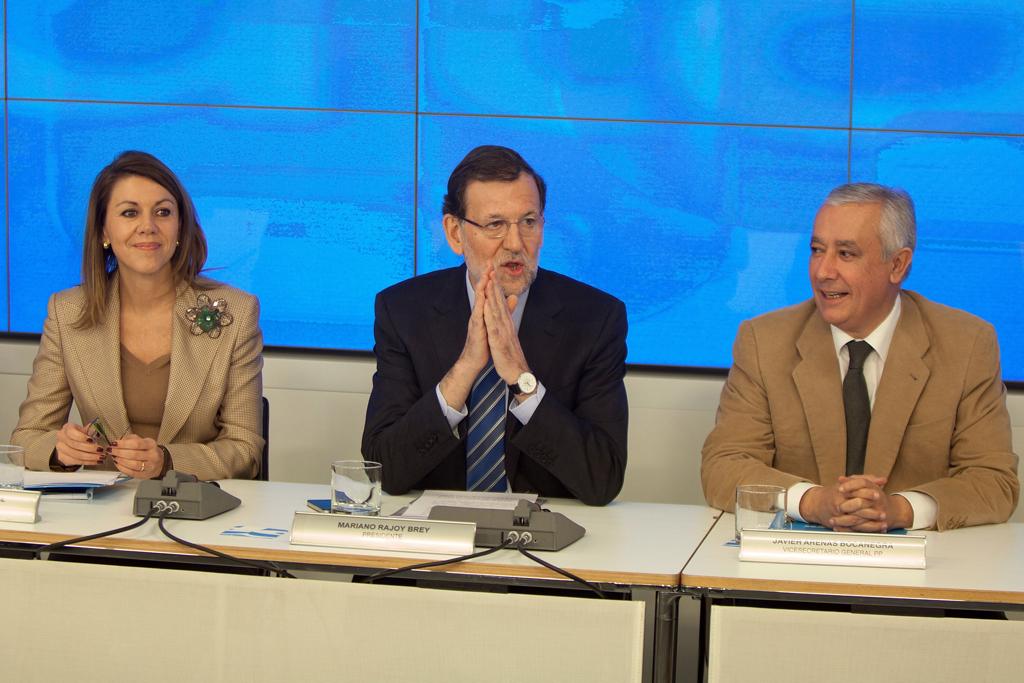JPMorgan: Expect long-term damage in Spain
From left, Popular Party Secretary General Maria Dolores de Cospedal, Spanish Prime Minister Mariano Rajoy and PP Vice Secretary Javier Arenas. The conservative party is under fire after allegations of corruption.
The current scandal surrounding Spanish Prime Minister Mariano Rajoy will not disappear any time soon and investors should expect ongoing volatility, according to the European research team at one of the world's largest banks.
Spanish newspaper El Pais published corruption allegations in January against Spanish Prime Minister Mariano Rajoy and other senior members of his party, the Partido Popular (PP).
The documents allege Rajoy received regular cash payments of 25,000 euros ($33,875) from 1997 onward, which were hidden from tax authorities. Anti-corruption lawyers are due to question former treasurer Luis Barcenas over the claims of the secret payments.
Rajoy has fiercely denied the allegations and has promised more transparency. He has also pledged that Spain will see off its worst financial crisis in recent years, as he seeks to continue the tough reforms sparked by the euro zone crisis.
"Public confidence in the government may not recover. The scandal could prove to be a turning point in the public acceptance of fiscal consolidation," Alex White, an analyst at JPMorgan said in a research note.
"Public anger will clearly make it more difficult for the Spanish government to sell the need for ongoing fiscal adjustment and structural reform. This will make the government's position significantly more difficult — events since the last election have taken a major toll on the PP's poll ratings and there will be increased caution about any steps that could exacerbate its problems further."
Rajoy is likely to survive the scandal, according to White, and even if he doesn't elections look very unlikely in the near-term, he said.
White's key concerns regarding the scandal are the potential to damage support for the prime minister from the regions, divert the government's reform efforts and dampen market confidence.
Interest rates on Spanish 10-year benchmark bonds ticked up to 5.5 percent on Monday after being at lows of 4.9 percent in mid-January and the IBEX 35 Index sunk 3.5 percent over this political uncertainty.
"If there were to be a need for major additional reform efforts, Spain could face renewed difficulty in the new environment, but the effect should be limited if the current economic context does not worsen (the 2012 deficit numbers, to be released at the end of this month, could make the situation more difficult if they surprise significantly to the downside)," White said.
"The prospect of a weakened partner in Madrid is likely to concern European leaders, but there will be very little they can do about it."
White doesn't foresee any major impact from the current scandal unless a Rajoy departure leads to sovereign yield spikes to around 7 percent, triggering the European Central Bank's latest asset buying scheme — the Outright Monetary Transactions.
"The overall picture, in most scenarios, appears to be one of incremental long-term damage from the Barcenas affair, rather than a critical hit to Spain in the near-term," he said.
More from our partners at CNBC:
CNBC: Survey: Europe consumers are world’s most pessimistic
CNBC: RBS hit by $612 million fine on Libor scandal
CNBC: British PM Cameron courts rich allies in EU budget battle
We want to hear your feedback so we can keep improving our website, theworld.org. Please fill out this quick survey and let us know your thoughts (your answers will be anonymous). Thanks for your time!
